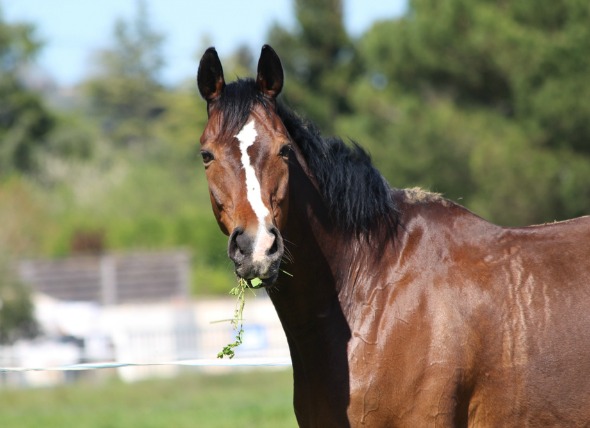Two women on horseback, about 30 meters away, were riding by as I rejoined the narrow path after long sitting at creekside this morning. In a meditative state, I stood and waited until they passed.
When the lead horse reached me, it looked me in the eye, halted momentarily and shied a bit. The lady rider, sensitive to the horse, reassured the animal, and said to me in a tone that belied her words, “people stand in the shadows.”

That’s not it, I wanted to say, but I simply smiled as they passed. Though I’m not a horse person, I realized that the horse sensed something the women didn’t, and few people do—the difference between a human in a ‘normal’ state of consciousness, and a human being in another order of consciousness altogether.
I would have liked to tell the horsewomen an interesting horse story that took place a few years ago at almost the same spot. It occurred as I was sitting at a nearby picnic table, with my back to the path, at the end of an intense, hour-long meditation.
What happens during methodless meditation is simply this. One watches everything outwardly and inwardly without judgment or interference, letting the senses open fully and harmonize. The mind-as-thought runs on like it usually does, but one watches it carefully too, with no more judgment or interference than watching leaves and twigs float by on the stream.
There is no goal; the watching is its own delight and its own end. One does ask however, ‘Is the observer operating?’ The observer is the source of division, the illusory self, the ‘me’ that judges, evaluates and chooses.
Watching the watcher, the watcher drops away, and there is just watching. This is the most important action that the human being can do, wherever he or she lives, whatever one’s cultural or linguistic background. For undivided, undirected attention alone allows the spaces between thoughts to grow, and thought to fall silent.
When that happens—and it always happens spontaneously, without effort, will or any kind of idea and goal—attention gathers and ends all duality, even as inside vs. outside.
Take the time to remain with what is as it unfolds in nature and the world—the shallow, rippling creek; the unseen crow cawing nearby; the people passing by on their bikes or on their cells or both. And remain, in the same way, with what is as it unfolds within–memories and associations, as well as any emotions that arise such as anger or sorrow. Then you’ll see that the whole movement of consciousness, as we know it, suddenly stops.
This happens every time I take a meditation of any duration outdoors. There is a ‘phase shift’ of consciousness. One is aware that something has occurred, but since the ‘I’ is not operating, it is all encompassing, like nature itself where one can still see, hear and feel the movement of nature.
Having entered that unsought state a few years ago, two women also approached on horseback. Without even turning around at the picnic table, I could feel the awareness of the horse a few feet behind me. Then it stopped and refused to move.

When I turned, the horse was looking me in the eye, in that way horses do. It was refusing to budge, though the woman kept squeezing its flanks with increasing impatience. Though the animal had seen many humans, it had apparently never encountered a human being in a meditative state before.
Not sure this wordless insight was correct, I remained still, waiting to see what would happen. The rider was quite unintelligent, unlike the rider sensitive to her horse today, and grew exasperated. “Speak,” she nearly shouted, “it doesn’t know what you are.”
You don’t know what you’re saying I thought, but refrained from voicing that, and instead humorously replied, “Hello horse.” The animal immediately resumed its gait, but neither woman so much as creased a smile.
Given these accounts are accurate and true, my question is, why does one revert and return to the stream of human consciousness, rather than remain in the consciousness of the human being?
Martin LeFevre

